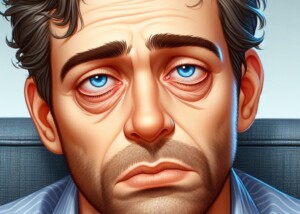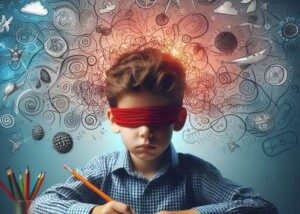There are clear signs that indicate your child was misdiagnosed with ADHD.
ADHD is an acronym that describes a large group of features in an individual.
There is no diagnostic test known that definitively confirms that a child (or adult) actually has attention deficit hyperactivity disorder, which is a lifelong neurodevelopmental condition.
Because kids by nature can exhibit the very symptoms of attention deficit hyperactivity disorder, it’s easy for kids to get misdiagnosed with ADHD.
The symptoms of ADHD overlap those of other conditions.
Let’s begin with a most unexpected reason that would explain why your child has been wrongly diagnosed with attention deficit hyperactivity disorder. And that is a problem with sleep.
There is a medical condition that is frequently misdiagnosed as ADHD, says Steven Y. Park, MD, otolaryngologist and author of “Sleep, Interrupted: A Physician Reveals The #1 Reason Why So Many Of Us Are Sick And Tired.”
The medical condition is obstructive sleep apnea — yes, sleep apnea; this vastly misdiagnosed condition is not limited to overweight middle-age men.
Dr. Park says, “It’s been estimated that about one-fourth to one-third of all children with ADHD actually have untreated obstructive sleep apnea.”
Sleep apnea is a condition in which breathing temporarily stops many times during sleep.
Typically, the person with OSA actually sleeps through these events, unaware that they’re occurring.
This deprives the brain of oxygen, which can lead to problems such as impaired concentration, irritability, restlessness, being easily distracted and other features that are commonly found in someone diagnosed with ADHD.
A study has shown that after adeno-tonsillectomy, 50 percent of children who had ADHD diagnosed before this surgery had no more symptoms after the operation, continues Dr. Park.
He adds that hyperactive kids do better on stimulant medications such as Adderall and Concerta because the kids are sleepy — due to the untreated sleep apnea!
Snoring is a hallmark symptom of sleep apnea, though not every snorer has sleep apnea, and not every person with OSA is a snorer.
So if your impulsive, fidgety child never snores, this doesn’t mean they can’t have OSA.
Dr. Park says that 81 percent of all children diagnosed with ADHD snore to some degree. That’s a lot.
Many circumstances can lead to behaviors that fit the criteria for attention deficit hyperactivity disorder in kids.
“It is very important to distinguish between attention span and activity problems as symptoms rather than causes of behavioral difficulties,” says Gloria S. Rothenberg, PhD, clinical psychologist and school psychologist in New York with over 25 years’ experience working with children and families.
She continues, “Such behaviors can commonly be seen in children who are anxious, obsessive, depressed, traumatized, or dealing with family crises such as divorce or illness in a loved one.
“Also, such symptoms can be seen after certain head injuries or as a drug side effect to such medications as asthma meds.”
Consider the possibility that your child has been misdiagnosed with ADHD.
Yes, they may actually have the neurodevelopmental condition, but the consideration that the symptoms may actually be OSA is very well worth investigating.
And sometimes, the symptoms can be the result of ineffective parenting.
Example: My brother and his wife don’t correct their young son when he gets hyper, loud or interrupts.
These behaviors fit some ADHD criteria, and he takes an ADHD drug.
However, when I myself correct him for being loud, hyper or interrupting, he complies!
Thus, we must wonder if his behavior is the result of lax parenting, rather than his brain being wired atypically.
Dr. Rothenberg explains, “It is crucial that a full history be obtained and that children have a full psychological evaluation to rule out the above alternative diagnoses before a course of treatment for ADHD is initiated.”


 Dr. Park
Dr. Park







































